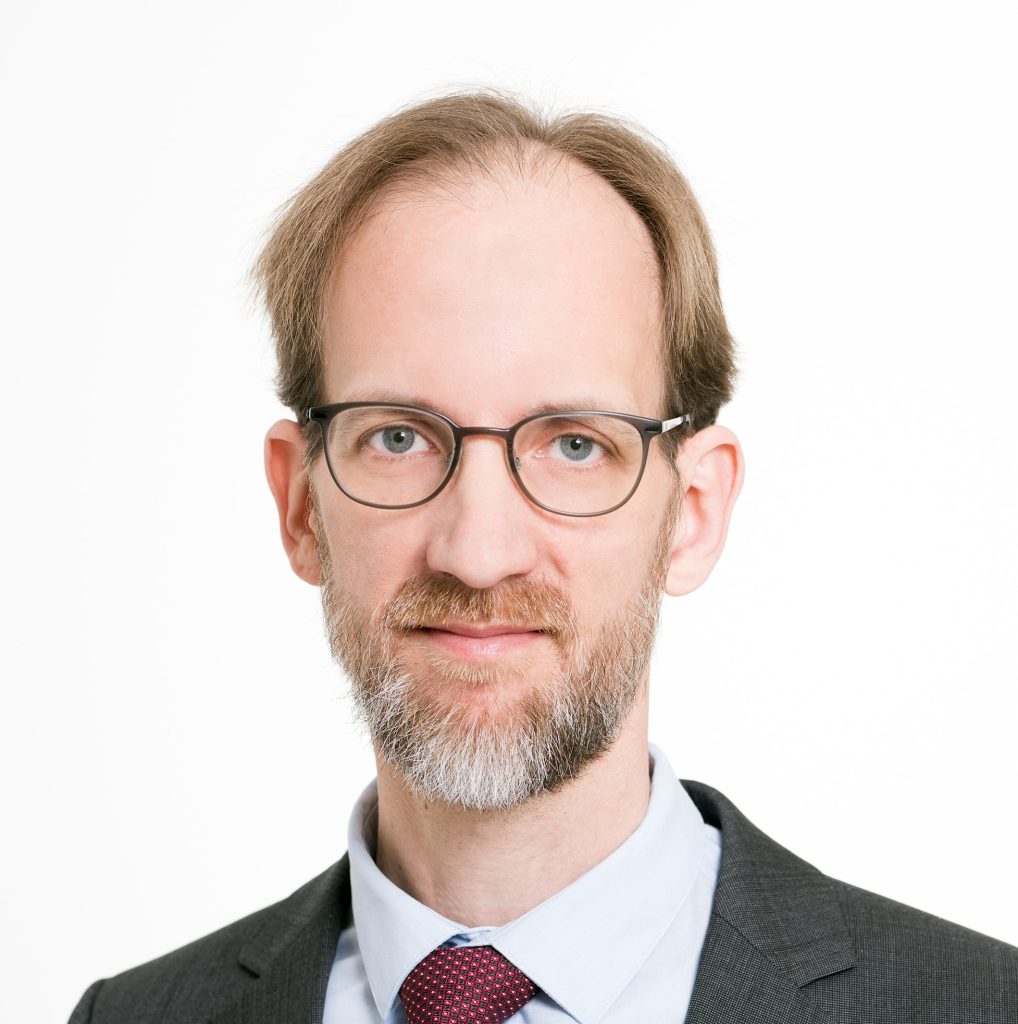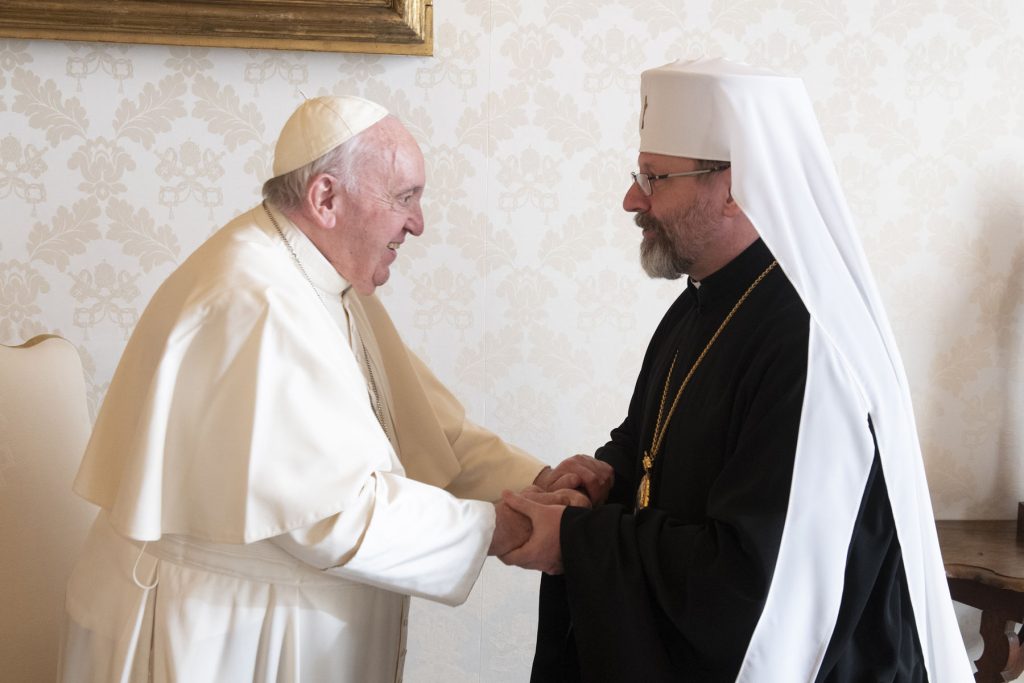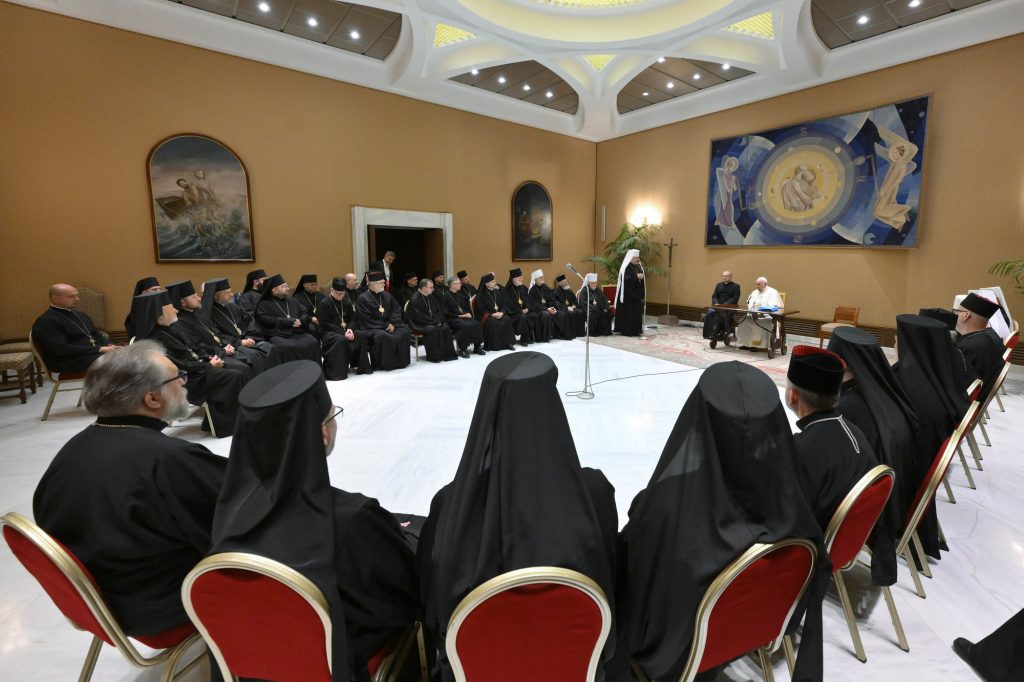
Thomas Mark Németh is Professor of Theology of the Eastern Churches at the Catholic Faculty of the University of Vienna and Priest of the Ukrainian Greek Catholic Church.
In this article I focus on the Pope’s attitude toward the Russian-Ukrainian war in the context of the Vatican’s relations with Ukrainian Greek Catholic Church (UGCC). [1] Standing in full communion with the Roman Pontiff and belonging to the Catholic Church, the UGCC is also a sui iuris Church with a specific autonomy, having its own first hierarch and a Synod of Bishops and sharing the Byzantine Rite with the Orthodox Church.
Surveys show that Christian Orthodoxy is Ukraine’s majority religion, with faith adherents comprising 60–70% of Ukraine’s population. Catholicism with the UGCC as an Eastern Catholic Church (10%) and the Roman Catholic Church (2%) is the second largest denomination in Ukraine. The UGCC plays a significant role in the public discourse in Ukraine. According to various public opinion polls, UGCC head, Major Archbishop Sviatoslav Shevchuk, enjoys a remarkable public confidence in Ukraine. Regarding the Pope’s perception in Ukraine, another more recent survey shows a rather low level of public confidence (3%); a half of the respondents either do not know the Pope’s position regarding Ukraine or do not pay attention to it. Almost 34% expressed—with gradations—a negative attitude towards the Pope’s position.
While the UGCC enjoys a significant level of autonomy in its structure and religious life, the relationship to the Holy See is a more complex issue for Greek Catholics than for Roman Catholics. Although the UGCC is the largest among the Eastern Catholic Churches, it has not yet achieved the rank of a Patriarchal Church, a designation only the Pope can grant. The Vatican’s relationship with the Russian Orthodox Church also plays an important role in shaping the Holy See’s policy towards the UGCC.
The beginning of the full-scale invasion added complexity to Holy See/UGCC relations. On Good Friday 2022 at the Colosseum’s Way of the Cross event under the direction of the Pope, a Ukrainian woman and a Russian woman carried the cross together at the thirteenth station, provoking negative reactions in Ukraine. Major Archbishop called this act “untimely,” and the texts about and gestures at the event “incoherent and even offensive.” Kyiv nuncio Archbishop Visvaldas Kulbokas stated that reconciliation can come only when aggression has stopped. Myroslav Marynovych, a former dissident and vice rector of the Ukrainian Catholic University (UCU) in Lviv, pleaded for a distinction between the one cross of Jesus and the different crosses of a victim and a perpetrator.
Despite this backlash, a year later the Vatican combined the testimonies of a Ukrainian boy and a Russian boy at the Way of the Cross event at the Colosseum. The Roman Curia gives the impression of being “above things,” but this approach results in blind spots. In light of the church abuse scandals, it is strange that there is not enough awareness of how easily expressions like “forgiveness,” as well as the appeal to the cross, can be instrumentalized.
UGCC Major Archbishop Sviatoslav’s Position
In an extensive interview in June 2023, UGCC head Major Archbishop Sviatoslav addressed the lack of communication between the Holy See and Ukraine, noting, “We all in Ukraine feel that today the Pope does not fully understand the pain of Ukraine, and Ukraine does not understand the Pope.” Regarding the Pope’s planned visit to Kyiv, which might be connected to a papal visit to Moscow, Sviatoslav said he was still not clear what message the Pope wanted to bring to Ukraine. Sviatoslav acknowledged the Vatican’s specific diplomatic tradition of neutrality, with dialogue as its main instrument, but added that the Vatican’s distinction between diplomatic and moral neutrality had been clearly drawn only later. According to Sviatoslav, the Ukrainian state doesn’t fully “understand the opportunities offered by the Vatican to defend our national interest,” and he pleaded for a more active stance from the Vatican.

At the end of 2022, Sviatoslav commented on the Pope’s statement that “Russian people are a great people” and his positive allusion to Dostoevsky. Sviatoslav told the Pope that in the opinion of Ukrainians he had not “read Dostoevsky properly,” and noted that romantic views on Russia exist not only in the West, but also in Rome. Sviatoslav also proposed that the Pope write a letter to the Ukrainian people. The letter appeared in November 2022, and was composed in an empathetic tone, but showed restraint in naming the aggressor. In order to counteract discontent within his own Church, Sviatoslav also conveyed positive aspects about the neutrality of the Holy See, noting that it contributed to the release of thousands of prisoners of war. However, he also added that “the Vatican is indeed a very powerful target of influence from Russia” and that this fact is shaped by Pope Francis’s view of the world from the perspective of the Global South.
Sviatoslav said in his recent interview “not to be afraid that the faithful of the UGCC will leave our Church because of certain misunderstandings that we have today with certain political positions.” Catholics should distinguish between the Pope speaking on international issues and his ecclesiastical role as the successor of the Apostle Peter. According to Sviatoslav, “all healthy criticism is useful and, interestingly, the Pope allows us to do so and listens to it.” However, it is questionable how much the Pope takes into consideration such criticism. This can be seen on the controversy over Pope Francis’s comments during a meeting with catholic youth in Russia, in which the Pope referred to “the great Russia of Peter I, Catherine II, that great, enlightened empire.” Sviatoslav responded very recently on August 27, calling the reference to Russia’s past “the worst example of imperialism and extreme Russian nationalism,“ and noting, „There is a danger that these words could be taken as supporting the very nationalism and imperialism that has caused the war in Ukraine today.“ It remains to be seen what the Synod of Bishops of the UGCC, which will be held in Rome from September 3 to 13 and will include a meeting with the Pope, will bring in this issue which caused quite a lot disappointment in Ukraine´s society.
Major Archbishop Sviatoslav also extensively commented on the peacemaking activities of the Vatican. He said that, while visiting Kyiv, Moscow, and Washington, the Pope’s envoy, Cardinal Matteo Zuppi, had only the competence to listen, but not to act as a political mediator. He also praised President Zelensky’s visit to the Pope as “very fruitful.” Concerning Zelensky’s 10-Point Peace Plan, according Sviatoslav, the Vatican could take on three key areas: the return of children, protection of the environment, and food security.
Academic Voices
The UGCC also contributes to the war-related dialogue with the Vatican through academic discourse. In June 2023, the Ukrainian Catholic University organized the conference “Church Diplomacy and the Religious Dimension of the Russian-Ukrainian War,” in which I took part. The range of questions addressed at this conference reflected internal Greek Catholic debates about theological, ethical and political implications of the war and articulated the focal questions of the Holy See/UGCC relations. In particular, Dr. Cezary Kościelniak spoke about new traits of the Ostpolitik of the Vatican, which tries to “find compromises where there can be none.” Given that the Vatican’s current diplomatic efforts have yielded few results, Dr. Andriy Hlabse directed inquiries to the principle of being “supra partes” in the current war situation.
On a different occasion, Pavlo Smytsnyuk addressed the issue of the unresolved tension between just war and nonviolence in Pope Francis’s approach to peace ethics, but also of the importance “not to hold Russians collectively responsible for what the government is doing” and not to lose the perspective of reconciliation. Regarding the diplomatic steps of the Vatican in 2023, Anatolii Babynskyi noted that “in Ukraine, it was understood that there is no way for negotiations, and the Vatican has only now come to understand this.” According to Oleh Turiy and Yuriy Avvakumov, this war shows the need to rethink systems of interchurch and church-state relations. Turiy and Avvakumov argue that Ukrainians need to stop being objects and to take initiative, especially in light of inflexible structures in the Catholic Church.
A Learning Church
Recently, the UGCC made a long-discussed change in its calendar system, which means that calendar bound feasts will be celebrated thirteen days earlier, together with the major part of the Christian world. This shows that the Church is able to learn from societal processes and to act with a certain autonomy. Ukrainian Catholics face ambivalence arising from the different roles and functions of the Pope, who is the head both of the Catholic Church and of the Vatican state, as a pastor and a diplomat. This perception seems to promote a more mature approach to the relationship between the faithful and Church authority. The war against Ukraine is not only an enormous challenge for religious institutions [2], it also raises questions of how to deal with certain issues, where academic theology can play an important role. For example, Pavlo Smytsnyuk mentions the asymmetry between anti-gender issues and peace and social justice articulated in documents of the Ukrainian Council of Churches and Religious Organizations, Ukraine’s largest interfaith organization. Smytsnyuk emphasizes the need for preparing ground for peacebuilding by “dealing with collective blaming and dehumanizing language, development of reflection on just peace, reconciliation and healing, and keeping ecclesial autonomy from the state.” Since February 2022, Major Archbishop Sviatoslav has constantly addressed sensitive issues in his regular video messages. For example, on March 6, 2022, on the Sunday of Reconciliation, he elaborated on the difficulty of “speaking of forgiveness in the midst of war,” but asserted that this would be “the secret of victory.”

Russia’s war against Ukraine shows that the international activity of the Holy See is not based on political but on moral authority. For the Vatican it creates a significant challenge; while conducting its efforts to stop the war, it must weigh tactical considerations against clear testimony. Neutrality can make mediation possible but can also cost moral legitimacy. When the Vatican appeals to its own diplomatic tradition, the question arises as to its value when measures reach their limits. This is no less true for the leadership of the Catholic Church, which is currently going through a global crisis of confidence or, to put it more positively, a process of transformation.
At the UCU conference previously mentioned, Jan Tombiński asked whether church leaders should not focus more on post-conflict reconciliation processes. One example for this is the Polish-Ukrainian commemoration of the Volhynia massacre committed by the Ukrainian Insurgent Army during WWII against mainly Poles. In July 2023, the UGCC Head and the Head of the Polish Catholic Episcopate issued the Joint Statement “Forgiveness and Reconciliation,” referring to this and other difficult episodes of Polish-Ukrainian relations which require mutual healing of memory. In any case, there is a need for churches to take the victim’s perspective more clearly into account and opt for truth, justice, and human dignity. This cannot be done without listening to the voices of Christians on the ground. Therefore, the UGCC has its own role to serve its faithful in times of war, but also to contribute to the universal Church discourse through its experience in a reflective perspective and in exchange with academy and society.
[1] See my article: T. M. Németh, (2023). Pope Francis and Russia’s War against Ukraine. Studia Universitatis Babeș-Bolyai –Theologia Catholica Latina, 68(1), 99-109.
[2] See my article: T. M. Németh, (2023). Der Krieg gegen die Ukraine und die Kirchen: Anfragen an die Theologie. LIMINA – Grazer Theologische Perspektiven, 6(1), 234–255.
